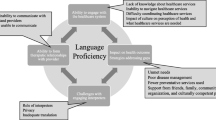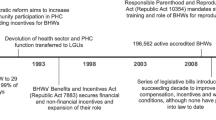Abstract
This paper assessed the effectiveness of Respondent Driven Sampling (RDS) in recruiting undocumented Latinx immigrants for a prevalence health study at a time of heightened immigration enforcement. RDS was used to collect and analyze data from clinical interviews with 254 undocumented Latinx immigrant adults, enabling inference to a population of 22,000. 45% of the sample reported having a chronic medical condition. The desired sample size was achieved and exceeded with three initial recruits and 10 waves of recruitment across 9 weeks. There was substantial cross-group mixing for recruitment in terms of sex and recency of immigration, which facilitated the emergence of diversity within recruitment chains. Primary factors that contributed to effective recruitment were location, flexibility, on-site childcare, and detailed explanation of the recruitment process. RDS is an effective recruitment method to study the health of undocumented Latinx immigrants, which is essential to informing intervention and policy.

Similar content being viewed by others
References
Do EK, Matsuyama RK. Healthcare utilization among hispanic immigrants with diabetes: Investigating the effect of US documentation status. J Immigr Minor Health. 2014;16:89–194.
Cervantes L, Tout D, Raghavan R, Linas S, Zoucha J, Sweeny L, Powe NR. Association of emergency-only vs standard hemodialysis with mortality and healthcare use among undocumented immigrants with end-stage renal disease. JAMA Intern Med. 2018;178(2):188–95.
Garcini LM, Peña JM, Galvan T, Fagundes CP, Malcarne V, Klonoff EA. Mental disorders among undocumented Mexican immigrants in high-risk neighborhoods: Prevalence, comorbidity, and vulnerabilities. J Consult Clin Psychol. 2017;85(10):927–36.
Cavazos-Rehg PA, Zayas LH, Spitznagel EL. Legal status, emotional well-being and subjective health status of latino immigrants. J Natl Med Assoc. 2007;99(10):1126–31.
Perez MC, Fortuna L. Psychosocial stressors, psychiatric diagnoses, and utilization of mental health services among undocumented immigrant latinos. J Immigr Refug Stud. 2009;3(1–2):107–23.
Young M, Madrigal DS. Documenting legal status: a systematic review of measurement of undocumented status in health research. Public Health Rev. 2017;38(1):26.
Garcini LM, Murray KE, Zhou A, Klonoff EA, Myers MG, Elder JP. Mental health of undocumented immigrant adults in the United States: A systematic review of methodology and findings. J Immigr Refug Stud. 2016;14(1):1–25.
Ramirez-Valles J, Heckathorn DD, Vázquez R, Diaz RM, Campbell RT. From networks to populations: The development and application of respondent-driven sampling among IDUs and latino gay men. AIDS Behav. 2005;9(4):387–402.
Heckathorn DD. Respondent-driven sampling: A new approach to the study of hidden populations. Soc Probl. 1997;44(2):174–99.
Tyldum G, Johnston L. Applying respondent driven sampling to migrant populations: Lessons from the field. London: Palgrave Pivot; 2014.
Vega WA, Kolody B, Valle R, Weir J. Social networks, social support, and their relationship to depression among immigrant mexican women. Human Organization. 1991;50(2):154–62.
Greer E (2005) study rankings on liberal and conservative cities. American City and County. https://www.americancityandcounty.com/2014/10/27/2005-study-rankings-on-liberal-and-conservative-cities/. Accessed 19 March 2020.
Dean AG, Sullivan KM, Soe MM (2013) OpenEpi: Open Source Epidemiologic Statistics for Public Health. Version 2.3.1. January 2013. https://www.scienceopen.com/document?vid=61cdd360-9883-4330-8c18-3f0341b0f715. Accessed 17 March 2020.
Marcelli E, Holmes L, Estella D, da Rocha F, Granberry P, Buxton O. (In)Visible (Im)Migrants: The Health and Socioeconomic Integration of Brazilians in Metropolitan Boston. San Diego, CA: Center for Behavioral and Community Health Studies, San Diego State University; 2009. https://www.boston.com/bonzai-fba/Third_Party_PDF/2009/10/17/Marcelli_et_al_BACH_2009_Brazilian__1255753970_2565.pdf. Accessed 30 October 2020.
Hill L, Johnson H (2011) Unauthorized Immigrants in California: Estimates for Counties. Public Policy Institute of California. https://www.ppic.org/publication/unauthorized-immigrants-in-california-estimates-for-counties/. Accessed 17 March 2020.
Heckathorn DD, Semaan S, Broadhead RS, Hughes JJ. Extensions of respondent-driven sampling: A new approach to the study of injection drug users aged 18–25. AIDS Behav. 2002;6(1):55–67.
CAPI Software - Computer Assisted Personal Interviewing Software (2014). https://www.surveysystem.com/CAPI-software.htm. Accessed 19 March 2020.
Leeuw ED, Hox J, Snijkers G. The effect of computer-assisted interviewing on data quality. A review. In: Market Research and Information Technology. ESOMAR Monogaph; 1998. p. 173–98.
Handcock MS, Fellows IE, Gile KJ. RDS Analyst: Software for the Analysis of Respondent-Driven Sampling Data. Los Angeles, CA; 2014.
Borgatti SP. NetDraw software for network visualization. KY: Lexington; 2002.
Heckathorn DD. Extensions of respondent-driven sampling: Analyzing continuous variables and controlling for differential recruitment. Sociol Methodol. 2007;37(1):151–207.
Volz E, Heckathorn D. Probability based estimation theory for respondent driven sampling. J Off Stat. 2008;24:79–97.
Johnston LG, Khanam R, Reza M, et al. The effectiveness of respondent driven sampling for recruiting males who have sex with males in Dhaka. Bangladesh AIDS Behav. 2008;12(2):294–304.
Salganik MJ, Heckathorn DD. Sampling and estimation in hidden populations using respondent-driven sampling. Sociol Methodol. 2004;34(1):193–240.
Beaton D, Bombardier C, Guillemin F, Ferraz M. Recommendations for the cross-cultural adaptation of health status measures. Am Acad Orthop Surg revised. 2002;12:1–9.
California Healthcare Foundation. Chronic Disease in California: Facts and Figures. 2006. Retrieved on March 23, 2020 from https://www.chcf.org/wp-content/uploads/2017/12/PDF-ChronicDiseaseFactsFigures06.pdf. Accessed 30 October 2020.
Acknowledgements
This study was funded by a Grant from the National Institutes of Health, National Heart, Lung, and Blood Institute (NHLBI) (K01HL150247; PI: Garcini), the Ford Foundation Fellowship Program and the Programa de Investigación en Migración y Salud (PIMSA). The content is solely the responsibility of the authors and does not necessarily represent the official views of the National Institutes of Health.
Funding
This study was funded by a Grant from the National Institutes of Health, National Heart, Lung, and Blood Institute (NHLBI) (K01HL150247; PI: Garcini), the Ford Foundation Fellowship Program and the Programa de Investigación en Migración y Salud (PIMSA).
Author information
Authors and Affiliations
Contributions
All authors contributed to the study conception and design. Material preparation, data collection and analysis were performed by LG, TG, and JP. The first draft of the manuscript was written by LG and all authors commented on previous versions of the manuscript. All authors read and approved the final manuscript.
Corresponding author
Ethics declarations
Conflict of interest
The authors declare that they have no conflict of interest.
Informed Consent
Participants provided verbal consent prior to the interviews, and the study was approved by the San Diego State University/University of California San Diego Joint Institutional Review Board.
Additional information
Publisher's Note
Springer Nature remains neutral with regard to jurisdictional claims in published maps and institutional affiliations.
Rights and permissions
About this article
Cite this article
Garcini, L.M., Galvan, T., Peña, J.M. et al. Effectiveness of Respondent-Driven Sampling for Conducting Health Studies Among Undocumented Immigrants at a Time of Heightened Immigration Enforcement. J Immigrant Minority Health 24, 102–110 (2022). https://doi.org/10.1007/s10903-020-01112-4
Accepted:
Published:
Issue Date:
DOI: https://doi.org/10.1007/s10903-020-01112-4




